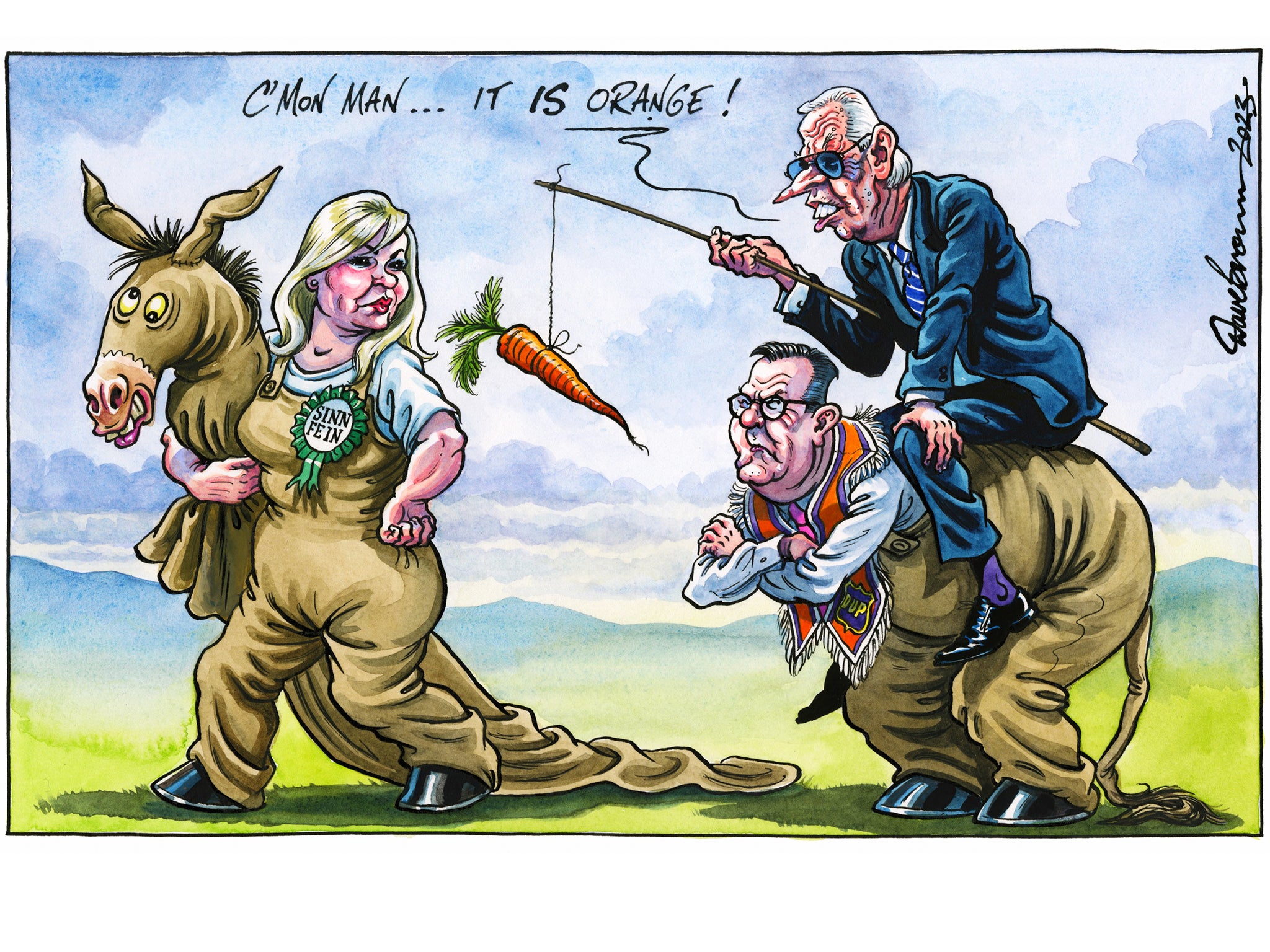Perhaps it’s just as well that president Joe Biden only spent a few hours in Northern Ireland, confined himself to making a friendly speech at the University of Ulster, and chose not to invest any political capital in attempting a breakthrough on a par with the 1998 Good Friday Agreement.
While no more malicious than any other member of the Irish diaspora getting sentimental about their roots, the president’s well-known affection for the old country has evidently riled some senior figures in the Democratic Unionist Party.
The former leader Arlene, now Baroness, Foster declared that Mr Biden “hates the UK”; while the splenetic Sammy Wilson claims that the president is anti-British. Their party leader, Sir Jeffrey Donaldson, has refrained from endorsing his colleagues’ unnuanced analyses, wisely. No good comes from insulting the leader of the world’s only superpower.
The DUP hotheads are unfair on Mr Biden. No other conflict in the world, with the exception of Israel-Palestine, has attracted such attention from successive American presidents as The Troubles. President Clinton, and especially his personal envoy Senator George Mitchell, was instrumental in securing the paramilitaries’ ceasefire and subsequent peace agreement.
As Mr Biden recalled in Belfast, it was his fellow senator who told him that the Good Friday Agreement arrived after 7,000 days of failure and one day of success. It took most of the 1990s for the process begun by John Major and then Taoiseach Albert Reynolds to result in the Good Friday Agreement, and some years more before it became more stable and established.
The high point was the unlikely but highly successful partnership between Ian Paisley and Martin McGuinness: two men who carried such prestige that they could never be accused of “selling out”. When their time eventually passed, they left a vacuum which is yet to be filled.
It was local leaders who turned the Good Friday Agreement into the reality of everyday governance and a guarantee of peace. It is a lack of local leadership that is now undermining the agreement. Mr Biden cannot make power-sharing work; he can remind the parties that America will support them. That is exactly what he came to do. He did not come to broker a new political settlement.
The president makes his wisecracks, but they betray the fact that it’s now almost two centuries since his forebears travelled to America. He himself sometimes lacks a certain instinctive balance in his remarks about contemporary Ireland.
If pushed, privately, he might well be one of those people, by no means not confined to the bars of Boston or Brooklyn, who express wistful sympathy for the ideal of a United Ireland, without thinking it through too hard. Too many in America chose to ignore the ugly reality of the activities of the Provisional IRA.
Mr Biden may well regret the fact that Ireland was partitioned in 1922, but that does not mean that he despises the British or the UK. He gets on well enough with Rishi Sunak, and indeed most of the political leaders in Northern Ireland and Ireland.
Like any practical politician who knows the art of the deal (and he is that sans pareil) Mr Biden knows full well that the Belfast Agreement, the Northern Ireland Assembly, the power-sharing executive and now the Windsor Framework are the only game in town. Irish unity is not on Mr Biden’s or America’s agenda. Or, truth be told, most anyone else’s. The DUP’s suspicions are unfounded.
Indeed, it should be added that it is actually not Mr Biden who is responsible for the present economic border between Northern Ireland and Great Britain, but Boris Johnson. It was Mr Johnson, not Mr Biden (not even president at the time) who signed the EU-UK Brexit Treaty and the Northern Ireland protocol.
It was Mr Johnson who went to the DUP conference and told Baroness Foster, Mr Wilson and the others that such a thing would only happen “over my dead body” – and then went and committed the gruesome anti-British act to “get Brexit done”.
At any rate, the world is different now. Bill Clinton, George Bush and Barack Obama were (and would now be) regarded as better, more unbiased power brokers than Mr Biden. So might Jack Kennedy have been (though he didn’t visit the province when he came over to look the folks up). But such skills are no longer needed.
The DUP, with few exceptions, doesn’t have a problem with the Good Friday Agreement as such, nor a quarrel with Sinn Fein (at least about that). Its grievance is with the British government, and the way Brexit has loosened the bonds of union. Yet Brexit is exactly what the DUP campaigned for, alone among the main Northern Irish parties, and the people of the province still voted Remain in the 2016 referendum.
The most bitter irony of all is that the DUP ended up with this most anti-British of arrangements, the border down the Irish Sea, because of a policy it backed and a prime minister, Mr Johnson, it at first placed its trust in.
It really cannot blame anyone but itself, and certainly not Mr Biden. Thankfully, the president, certainly sceptical about Brexit and wary of Mr Johnson, was tactful enough not to remind them of their folly.







Join our commenting forum
Join thought-provoking conversations, follow other Independent readers and see their replies
Comments